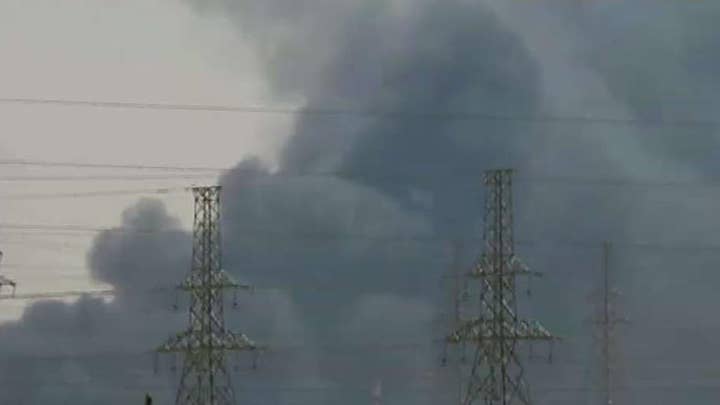Trump administration continues to advocate for fracking in state of Pennsylvania
Insight from Pennsylvania Congressman Mike Kelly.
Hours after announcing a "permanent cease-fire" between Turkey and the Kurds in Syria, President Trump focused on domestic matters during a speech Wednesday in Pittsburgh where he touted his administration’s moves to deregulate the oil and gas industries in the key battleground state of Pennsylvania.
Trump flaunted his actions to bolster the oil and gas industries in the country – including approving some controversial pipelines, pulling out of Paris Climate Accord and abandoning former President Barack Obama’s Clean Power Plan – while slamming Democrats for putting the fossil fuel industry "under assault," as he put it.
"Our natural resources don’t belong to the government, they belong to the people," Trump said during the speech at the Shale Insight Conference. "We've ended the war on American energy and we’ve ended the assault on American energy workers."
The president’s speech, in front of an audience comprised heavily of blue-collar workers from Pennsylvania, Ohio and West Virginia, marked the second time in three months he has traveled to the Keystone State. Pennsylvania, which Trump narrowly won in 2016, would be a crucial state to win in the next presidential election; Trump apparently has seen his pro-industry policies as a path toward winning it, and his reelection, once again.
The president railed against a ban on fracking – which had the support of many Democrats seeking to unseat him in 2020 – arguing that the controversial method of extracting natural gas brought wealth to rural and downtrodden areas and will create a boom in construction jobs throughout the state.
"My job is to represent to people of Pittsburgh, not the people of Paris," Trump said, resurfacing a line he used previously.
The politics surrounding the oil and gas industry in Pennsylvania, however, has not been as clean as Trump said the pipelines will be.
In the suburbs that might be key to his path to victory, Pennsylvania voters have shown a growing opposition to the drilling and massive pipelines required to move its product across the state. Candidates in state and local races increasingly have been hardening their stances on the industry. National polling showed growing skepticism of fracking, the process used in extraction.
While the issue is unlikely to have a game-changing effect on the race already dominated by Trump's strong personality, a looming impeachment fight and accusations of racism, Trump's eagerness to promote the industry underscored his tight focus on shoring up his base of rural voters, even at the risk of alienating others.
"Today, I'm proud to declare that I've delivered on every single promise I made to this conference three years ago and much, much more," Trump said.
Several Democrats seeking the White House have taken their own political risks on the issue. Backed by environmentalists on the left, soe candidates— including Sens. Bernie Sanders and Elizabeth Warren — have broken from the party's past support for fracking to call for a nationwide ban. More centrist candidates, including former Vice President Joe Biden, have declined to go that far.
CLICK HERE TO GET THE FOX NEWS APP
Biden, who also was in Pennsylvania on Wednesday, openly criticized Trump, saying the policies he espoused hurt those very same blue-collar workers the president was courting later in the day.
Biden cast the wealthy president as a charlatan populist whose tax policies, economic stewardship and overall erratic leadership style has hurt U.S. workers.
"This administration has no idea what hard-working, decent, ordinary Americans are going through," Biden said during a speech in his hometown of Scranton.
Biden has argued that he could reassemble Obama's winning coalition by winning back some working-class white voters who sided with Trump while reversing Democrats' decline from 2012 among nonwhite voters in cities such as Philadelphia, Detroit and Milwaukee.
The Associated Press contributed to this report.



























